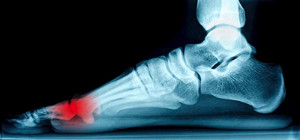Freehold (732) 294-9393
Freehold (732) 294-9393
 Sesamoiditis is a condition caused by injury to the sesamoid bones, located just behind the big toe, or by inflammation to the tendons surrounding the sesamoid bones. Sesamoiditis is usually the result of a sudden increase in the use of these bones during activities such as running or jogging. Symptoms of this condition include pain, slight swelling, or redness near the big toe. They typically start out mild and increase in severity over time and with repeated activity. If you suspect you may have sesamoiditis, visit a podiatrist. Treatment usually consists of resting and icing the foot, along with using over-the-counter anti-inflammatory drugs to decrease pain. Occasionally, a podiatrist may recommend modified footwear or bandaging and immobilizing the big toe to prevent putting further pressure on the toe and aggravating the injury.
Sesamoiditis is a condition caused by injury to the sesamoid bones, located just behind the big toe, or by inflammation to the tendons surrounding the sesamoid bones. Sesamoiditis is usually the result of a sudden increase in the use of these bones during activities such as running or jogging. Symptoms of this condition include pain, slight swelling, or redness near the big toe. They typically start out mild and increase in severity over time and with repeated activity. If you suspect you may have sesamoiditis, visit a podiatrist. Treatment usually consists of resting and icing the foot, along with using over-the-counter anti-inflammatory drugs to decrease pain. Occasionally, a podiatrist may recommend modified footwear or bandaging and immobilizing the big toe to prevent putting further pressure on the toe and aggravating the injury.
Sesamoiditis is an unpleasant foot condition characterized by pain in the balls of the feet. If you think you’re struggling with sesamoiditis, contact Dr. Henry Miller of New Jersey. Our doctor will treat your condition thoroughly and effectively.
Sesamoiditis
Sesamoiditis is a condition of the foot that affects the ball of the foot. It is more common in younger people than it is in older people. It can also occur with people who have begun a new exercise program, since their bodies are adjusting to the new physical regimen. Pain may also be caused by the inflammation of tendons surrounding the bones. It is important to seek treatment in its early stages because if you ignore the pain, this condition can lead to more serious problems such as severe irritation and bone fractures.
Causes of Sesamoiditis
Treatment for sesamoiditis is non-invasive and simple. Doctors may recommend a strict rest period where the patient forgoes most physical activity. This will help give the patient time to heal their feet through limited activity. For serious cases, it is best to speak with your doctor to determine a treatment option that will help your specific needs.
If you have any questions please feel free to contact our office located in Freehold, NJ . We offer the newest diagnostic and treatment technologies for all your foot and ankle needs.
Read more about Sesamoiditis